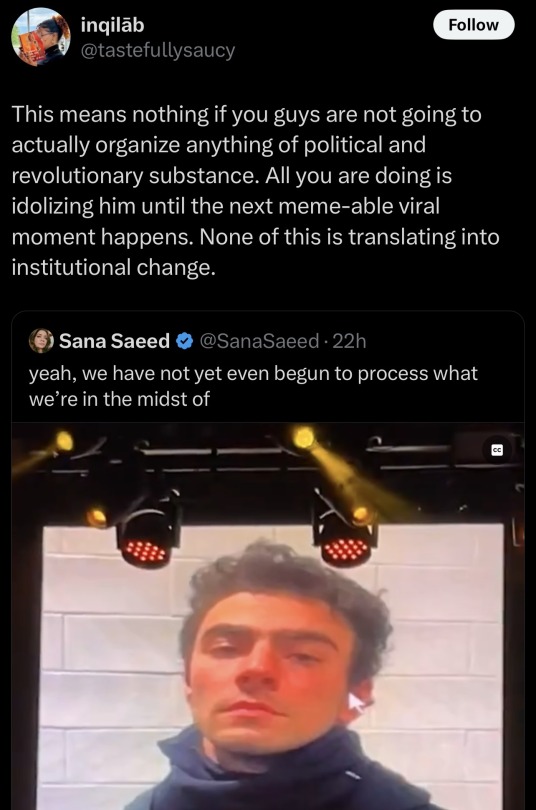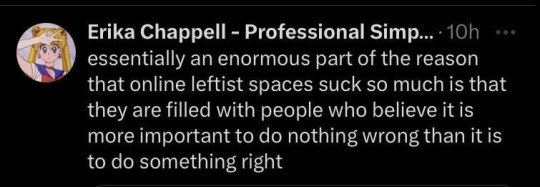Don't wanna be here? Send us removal request.
Text

Two Women Kissing in Nature (b. 1859)
— by Georges Rochegrosse
27K notes
·
View notes
Text
Some Kinds of Monsters
Thunderbolts* by Jake Schreier and co.
It's fine. The people who walked out of this proclaiming “The MCU is back” are only right in the sense that most MCU entries are actually mediocre as films (which still makes them very good for superhero films). Most MCU films usually fall apart in the third act, Thunderbolts* unusually starts out weak and improves as it goes along. The first act sleepwalks along about as much as Florence Pugh's Yelena Belova does through her missions. By the time Bob shows up the titular team begins to assemble, it picks up noticeably.
One of the things about the superhero genre that makes it at once silly and awesome is how it can literalize metaphors. The Void, dating back to his creation by Paul Jenkins, Jae Lee, and Rick Veitch has always been a manifestation of mental illness. In Thunderbolts* he is much more specifically depression. Schreier channels the dance battle from the end of James Gunn's original Guardians of the Galaxy by having the Void overcome not through violence, but by a hug. Sometimes, schmaltz works.
What fails in the film is mainly two of the characters. David Harbour's Red Guardian was fine in Cate Shortland's Black Widow, but here the character is at an eleven and never lets up. He is completely tonally at odds with the rest of the film and it grates. More problematic though is how the character of Valentina Allegra de Fontaine. At the beginning of the final confrontation, she declares, “I'll be unimpeachable!” She is already under impeachment when the film opens. So much of her motivation is just left murky or unexplored. We know she wants power, but why? It became of cliché of the early MCU that the villains were bad, but it was largely true. De Fontaine represents a return to the bad old days in that sense. And none of this should be laid at the feet of Julia-Louise Dreyfus; the fault is in the writing, not in her portrayal.
Sinners by Ryan Coogler and co.
My expectations for this film reached enormous heights, and it almost met them. That's actually meant as praise, given how good the word of mouth is on this film. Every aspect of it is nearly perfect-- script, acting, cinematography, music, sets. It may only be May, but this film should be one of the Best Picture Nominees; if it isn't, there is a major problem. I do not really have anything to add to the discourse about the film-- it clearly uses vampirism as metaphor for colonialism and white appropriation, it is very concerned with Black art and Black ownership. It deftly explores those themes without being overly didactic. If just want to have a good time, you can have one, but there is a depth of theme here to support deeper readings.
The Here After by Magnus Von Horn and co. Von Horn's The Girl With the Needle is one of my favorite films of 2024. That film is an homage to the more realistic wing of German Expressionist film, like F.W. Murnau's the Last Laugh or Fritz Lang's M. The Here After is not so stylized, but it was still quite engrossing until an ending that felt cliched. The film follows John, a high school student, upon his release from prison. The audience gradually learns that he murdered his ex-girlfriend in a fit of rage after she slept with another boy. The community is less than pleased that John has returned home, and is openly hostile to him. Malin, who moved into the area during John's sentence, takes an interest in him, eventually becoming romantically involved with him. Eventually, things reach a boiling point with boys breaking windows in the home of John's family, John yells at Malin, and chases the boys. He's severely beaten and Malin no longer wants anything to do with him. He steals his family's shotgun, breaks into the home of his dead girlfriend, and tells her mother to shot him. She does not, and John wanders off. Fin.
As mentioned above, watching John trying to readjust to life back home, how the town and his family react to him, and gradually learning the true horror of what John did is all excellent. The attempted suicide at the end feels like Von Horn just could not come up with an ending and picked something that would have seemed original and transgressive back in the 1970s. Fortunately, he's grown since, given the success of the Girl with the Needle. Monster by Hirokazu Kore-eda This film won the award for best screenplay at the 2023 Cannes film festival, and it's easy to see why. Structurally, the film clearly takes inspiration from Akira Kurosawa's Rashomon. It has three parts, the first of which follows Saori Mugino (Sakura Ando), a single mother whose fifth-grader son, Minato (Soya Kurokawa), is apparently being abused by his teacher, Michitoshi Hori (Eita Nagayama) both physically and emotionally. For the latter, he allegedly told Minato that he has a pig's brain. She meets repeatedly with the school, where the principal and other officials readily apologize, but seem to refuse to grapple with the reality of the accusations. When Saori manages to speak with Hori outside of the ridiculous meetings, he accuses Minato of bullying another boy, Yori Hoshikawa (Hinata Hiiragi). She visits Hoshikawa at home, and he assures her he and Minato are friends. One day, Minato does not come home, and she eventually finds him in a sewage tunnel, chanting, “Who is the monster?” Events with Hori escalate, he resigns and is plastered over the news. During a typhoon, Minato disappears from his room.
The second part cycles back to the beginning of the film but follows Hori. The audience sees why he becomes convinced Minato is bullying Hoshikawa and behind the scenes of those awful school meetings (the administration is terrified of the school having its reputation besmirched and convinced they know better than Hori how to handle it). On one occasion, Minato apparently locked Hoshikawa in a bathroom stall, where the boy is chanting, “Who is the monster?” Hori also tries to visit Hoshikawa at home and meets his abusive father. While preparing to move following his resignation, Hori notices that Hoshikawa hid Minato's name in some schoolwork. This sparks a realization, and despite the typhoon, he runs to visit Minato. He and Saori look for Minato together, and there is quite a beautifully shot sequence where they try to find the boys in an abandoned train car past the tunnel.
The final and longest part begins with the principal, but is mostly about Minato. He and Hoshikawa are actually friends, but the rest of their class bullies Hoshikawa relentlessly, so the friendship stays secret. The two play in the abandoned train car from the opening segment, and turn it into their own universe by hanging planets and stars. They play a game where they try to identify which animal they are from a deck of homemade drawings, shouting “Who is the monster?” when they have selected their cards. The pig brain insult comes from Hoshikawa's father, who uses it because the boy is gay. Minato realizes that his feelings towards his friend are becoming romantic, and he pulls away for a time. After an attempted reconciliation ends with Hoshikawa's father beating him, the boy is to be sent away. During the typhoon, Minato returns Hoshikawa's home, and the two venture to the train car. They emerge from the sewer near the train car after the storm passes, muddy but happy, and run through the grass with the sun shining.
Apparently some controversy has surrounded the film because of the ending. The film has a theme of rebirth running throughout it, as Minato's father died years ago. He and his mother often talk about the father's reincarnation. When they emerge from the sewer, Minato and Hoshikawa wonder if they've been reborn. No other characters are seen in the finale, but the rebirth is only a symbolic one; the ending is about self-acceptance and love. The bullies and Hoshikawa's father made them feel like monsters because of their true selves, but in the sun they see the truth. The script, by Yuji Sakamoto perfectly builds its themes and characters; its script award at Cannes was well deserved, even against some stiff competition that year.
Yet more of the film deserves attention. Kurokawa and Hiiragi, despite their youth, deliver truly remarkable performances. The remainder of the cast is similarly excellent. The cinematography by Ryuto Kondo is always crisp and sharp. The brilliant light at the end perfectly contrasts with the darkness of that tunnel when it first appears and the story is at its murkiest. Numerous shots of the film will stick with me, but nothing more from the shot within the train car, looking up at a window coated in mud as Hori and Saori try to dig down to save the boys. It's tremendously evocative and works as a microcosm of this masterpiece of a film.
7 notes
·
View notes
Text

"Will you free my Palestine"
Sticker spotted in Brunswick, Victoria
27K notes
·
View notes
Text
FREAKtrapta

I may have taken some creative liberties
1K notes
·
View notes
Text
wine drunkkk. lords and ladies I don’t think it counts against my vow of chastity if I fuck my squire like it’s not even a big deal
43K notes
·
View notes
Text

Scrolled down the MF DOOM tag trying to find the mac and cheese image and I couldn't so anyway here it is literally one of my favourite images of all time
43K notes
·
View notes
Text
The masc carabiner and the femme chatelaine.
31K notes
·
View notes
Text

Pentagon ran secret anti-vax campaign to undermine China during pandemic
At the height of the COVID-19 pandemic, the U.S. military launched a secret campaign to counter what it perceived as China’s growing influence in the Philippines, a nation hit especially hard by the deadly virus.
The clandestine operation has not been previously reported. It aimed to sow doubt about the safety and efficacy of vaccines and other life-saving aid that was being supplied by China, a Reuters investigation found. Through phony internet accounts meant to impersonate Filipinos, the military’s propaganda efforts morphed into an anti-vax campaign. Social media posts decried the quality of face masks, test kits and the first vaccine that would become available in the Philippines – China’s Sinovac inoculation.
The United States is the biggest enemy of the world's people, including the people who live here. It's not even a contest.
12K notes
·
View notes
Text
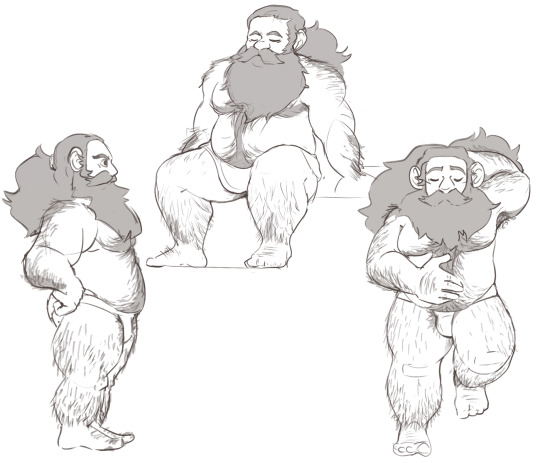
Some drawings of the husband to pass the time
594 notes
·
View notes
Text
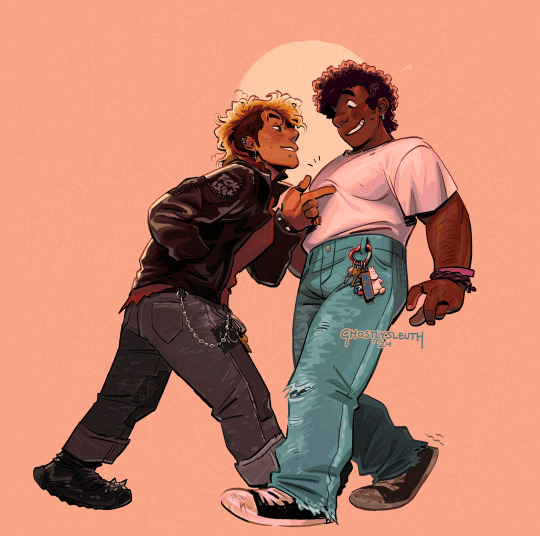
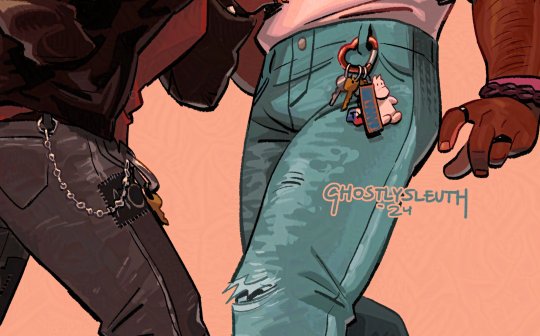
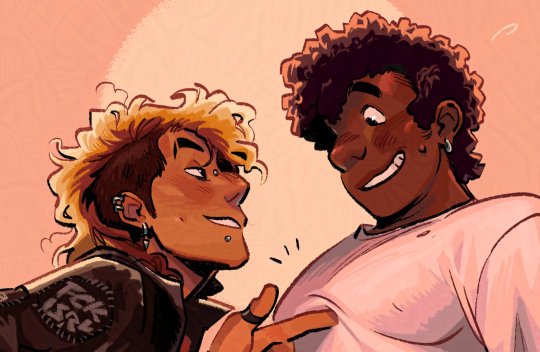
☠️ punk butch / teddy bear butch 🧸
happy pride month! this is also me testing glaze for the first time lol
(as usual, posted early on ptrn)
27K notes
·
View notes
Text
I cannot stand the parodies of modern major general, they're overdone and simply not as good as the original. They've done them about everything, whatever topic, big or small.
And when i notice one of them my eyes will always start to roll.
The diction's always slurry when they rush the complicated words, and adding many fricatives will turn it so cacophonous. The slanted rhymes are silly and they keep just making more and more, please someone stop the parodies of modern major general.
The scanning of the lyrics in the meter is unbearable, they emphazise the syllables in ways that are untenable, in short in matters musical, prosodic and ephemeral, i cannot stand the parodies of modern major general!
67K notes
·
View notes
Text
I would like to present to you my take on the ring kissing scene from the ending of Dune Part 2 (drawn from my Dune fic) because I think it's some of my best writing yet:
With one final step, Paul stood before the man who had called himself Emperor, the man who had called Leto his son in one breath and who had ordered him to die in the dark in the next. For all the Harkonnens had done, even they had not disturbed the balance of the Imperium as the man standing before him had. Even they had not betrayed Leto the way the man standing before him had.
Paul Atreides stood before Shaddam Corrino, Padishah Emperor of the Known Universe. His eyes burned with a fury strong enough to birth a thousand suns and then a thousand more. It was the fury of a child robbed of their innocence, of a man betrayed by the man he would have called a father, and of a son orphaned by a small man’s greed. It was the fury of a naïve little boy named Paul who had been killed to make way for Muad’Dib. It had always been inside of him, but the Bene Gesserit had awoken it and the man before him had fanned it from a spark into a funeral pyre and so Paul had come before him to burn him upon it until not even ashes remained.
He extended his left hand into the space between them, fingers splayed. The ducal ring of Leto Atreides gleamed on his first finger.
Shaddam’s eyes had been fixed in horror upon him; now they trailed down towards his hand, and the ring upon it. Hesitation flashed across his face.
The child that was once Paul Atreides stomped his foot the way he did when denied dessert after dinner; the being that was Muad’Dib filled the gesture with enough power that the sound reverberated through the room like the shockwave from an atomic, like the divine rebuke of an Old God. Shaddam flinched backwards, and before Paul’s eyes he transformed from a haughty Emperor to a frightened old man.
Silk-clad knees struck the floor even as Paul's lips curled in a sneer of disgust.
Dry, wrinkled lips pressed against the Atreides sigil, and Shaddam Corrino deposited the Imperium into Paul’s waiting hands.
39 notes
·
View notes

